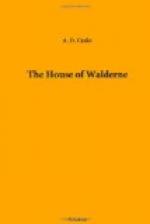The followers of Drogo made the place resound with their acclamations. The multitude cried, “Largesse! Largesse!” and by Drogo’s direction coins (chiefly of small value) were freely scattered to the accompaniment of the cry:
“Long live Sir Drogo of Walderne.”
Then the royal standard was displayed on the watchtower, over the banner of Walderne, and the common soldiers, in their thousands, pitched their tents and kindled their fires on the open green without, while those of gentler degree entered the castle, which was not large enough to accommodate the rank and file.
The banquet that night was a goodly sight. The king sat at the head of the board—his brother, King Richard, on his right hand (the King of the Romans), Edward, afterwards “The Hammer of Scotland,” on his father’s left. Next to King Richard sat John Balliol, and next to Prince Edward, Robert Bruce, father of the future king of Scotland, and a great favourite both with prince and king.
Drogo did not sit down at his own board. He preferred, he said, to play the page for the last time, and to wait upon his king, which was honour enough for a young knight. On the morrow he would attend the king to Lewes with fifty lances, where he trusted to justify the favour and honour which he had received.
Shall we once more go over the old story, and tell of the songs of the gleemen, the music of the harpers, of wine and wassail, of healths and acclaims, which made the roof, the oaken roof, ring again and again? Nay, we have tired the reader’s patience with scenes of that sort enough already.
But while the two kings, so like each other in features, were yet feasting, Edward, with his chief captains, held a council of war in another chamber, and Drogo stood before them. They questioned him closely of the state of the inhabitants of the forest: their political sympathies and the like. They inquired which barons and land holders were loyal, and which disaffected. They discussed the morrow’s journey, the roads, the chances of food and forage for the multitude. In short, they acted like men of business who provide for the morrow ere they close their eyes in sleep.
Then Drogo informed them that he had three prisoners, on whom he claimed the royal judgment: traitors, and disaffected men whom he had apprehended in the act of travelling the country, in order by their harangues to stir up the peasantry to resist the royal arms.
“Who are these doughty foes?”
“Sir Ralph, son of the rebellious baron of Herstmonceux; the mayor of the disaffected town of Hamelsham; and a young friar, formerly a favourite page of the Earl of Leicester.”
“Why didst thou not hang them on the first oak big enough to sustain such acorns?”
“I reserved them for the royal judgment, so close at hand.”
“Let us see them ere we depart in the morning, and we shall doubtless make short work of them.”




